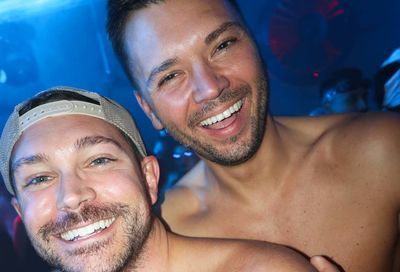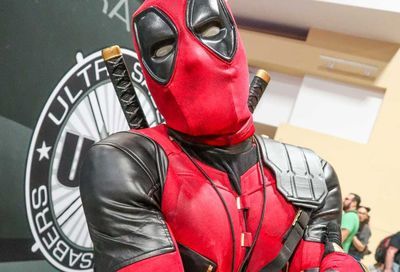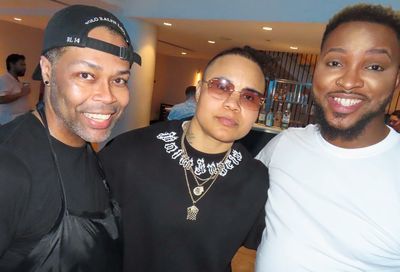Glock Blockers: Gays Against Guns launches first D.C. protest
Newly formed gun violence prevention group protests prominent gun lobby group conference held at local hotel

It was the massacre at Orlando’s Pulse nightclub that finally prompted Abraham Ruiz to get involved with pushing for gun reform.
“I took it very personally,” the 31-year-old D.C. resident says of the shooting that killed 49 people, the majority of whom were members of the LGBT community. “I’m a gay Latino. Most of the people who died in Orlando were Latino. I think it’s time to give them a voice, because they didn’t have a chance.”
That’s why, on Tuesday evening, Ruiz and about 20 other protesters stationed themselves outside the Marriott Wardman Park, where a conference of the National Shooting Sports Foundation (NSSF) was taking place. Protesters included representatives from existing gun violence prevention organizations, such as the Brady Campaign to Prevent Gun Violence, but the bulk of them were members of a newly created organization known as Gays Against Guns.
Clad in trademark spray-painted shirts, members held a 20-foot rainbow banner and various signs with messages reading: “Stop Killing Us,” “#WeAreOrlando” and “Glock Blockers.”
Chants included: “No gun reform, no peace! No common sense, no peace!” “NSSF! Come out, come out!” and “How many more have to die?” At one point, those assembled sang “We Shall Overcome,” as one protester read aloud the names of the 49 people killed in the Pulse nightclub shooting.
Modeled on the attention-grabbing demonstrations and direct activism that made organizations like ACT UP famous during the AIDS crisis, Gays Against Guns will call attention to the prevalence of gun violence and access to assault weapons in the United States. They hope to both inform the public and apply pressure on lawmakers and policymakers. Chapters have sprouted up in New York, Newark, N.J., Orlando, Chicago and Los Angeles, with plans to spread to other cities throughout the United States. The groups typically stage impromptu demonstrations such as “die-ins,” where people lay strewn across the ground to symbolize the victims lost to gun violence.
Michael Adolph, one of the co-founders of the D.C. chapter, says the fledgling organization has already grabbed significant interest. More than 90 people showed up at a planning meeting held at Town Danceboutique last week. For a city like D.C., that’s an impressive turnout, Adolph says.
“There’s a hesitancy to do these kinds of things in Washington,” he says. “I think it’s more staid here, and people are used to the [political] process, which doesn’t seem to work on this issue.”
The organization plans to hold future events designed to take the establishment by surprise. Gays Against Guns will “have a presence” at the Disarm Hate rally on Aug. 13, an LGBT-focused project of the Everytown for Gun Safety Action Fund, and will likely also have members attending ongoing protests held outside the Virginia headquarters of the National Rifle Association (NRA) on the 14th of each month.
As it grows, the organization hopes to build working relationships with existing GVP groups like Everytown, the Brady Campaign, and Moms Demand Action for Gun Sense in America, to share and leverage resources to apply pressure on politicians to push for sensible gun safety measures.

Tuesday’s protest was aimed squarely at a largely unfamiliar foe: the NSSF. Based in Newtown, Conn., it is the trade association for the firearms industry. But while they present themselves as advocates for hunters and shootings sports enthusiasts, gun violence prevention advocates say that’s just a front for their real constituency: gun show dealers.
According to government watchdog site OpenSecrets.org, the NSSF has given $149,250 in contributions to federal candidates during the 2016 cycle. They include current House Speaker Paul Ryan (R-Wisc.), former House Speaker John Boehner (R-Ohio), and Senate Majority Whip John Cornyn (R-Texas). But handing cash to Republican leaders isn’t where the NSSF spends most of its money.
“This year, they’re lower in donations to candidates, but they’re actually higher than the NRA in direct lobbying expenses,” explains Phil Attey, one of the co-founders of the D.C. chapter of Gays Against Guns.
The NSSF has spent $890,000 directly lobbying in 2016 so far, and spent more than $3.5 million in 2015. That’s more than the National Rifle Association (NRA), which has typically served as the face of the pro-gun movement. The NRA gives far more to candidates ($805,900), but only spent $735,000 in direct lobbying expenses in 2016.

Asked why so few people — including several of the protesters — are unaware of the NSSF’s existence, Attey says: “It’s all about branding. They pretend to be this group of duck and deer hunters that are concerned about the environment and safety, when in fact, they couldn’t be further from that. The members of their organization are gun manufacturing companies, gun dealers, and gun show operators.”
The protest also hopes to apply pressure, via negative publicity, on Marriott International for hosting the NSSF conference. Attey hopes Marriott, which has earned accolades for its LGBT-friendly employment policies and outreach to the LGBT community, will act similarly on the issue of gun safety.
“We acknowledge that they’re our friends,” Attey says, “but to quote Dumbledore, ‘It takes a great deal of courage to stand up to your enemies, but a great deal more to stand up to your friends.'”
Attey argues that not only Marriott, but other hotel chains — many of whom tout their inclusiveness and seek out LGBT consumer dollars — could take steps such as requiring or facilitating mandatory background checks at any gun shows held on their premises, or issuing policy statements that call on lawmakers to ban assault weapons, limit ammunition, or pass mandatory background checks.
“Corporate America can get ahead of Congress and policymakers on this issue, in the same way that they got ahead of Congress and policymakers on LGBT equality,” he adds. “Everyone knows that Marriott is a huge friend of our community, but we need them to stand up for us, not just for our rights as gay people, but for our rights and safety.”
Amanda Fore, 50, of Chevy Chase, an LGBT ally and mother, has followed several different gun violence prevention groups since the 2012 shooting at Sandy Hook Elementary in Newtown, Conn., which claimed the lives of 20 children and six adults. As a mother, she was frustrated that politicians refused to take action even after a school full of children was attacked.
“I just learned about what NSSF does, and I just think it’s really important that people know where the money is coming from, when they’re giving so much to members of Congress,” says Fore. She can’t understand the argument from gun advocates that arming people is the best way to protect against mass shootings like the ones at Newtown and Orlando.
“I think of my son, and I think of the world he’s growing up in. He was even worried about me coming today, because he was afraid I might get shot,” she says. “And this is a uniquely American problem. We travel overseas all the time, and I think it’s just crazy.”
While Orlando prompted many in the LGBT community to focus on the issue of gun reform, the problem of guns, coupled with anti-LGBT sentiment, is still a dangerous combination.
“I think the more we as a society are moving forward on LGBT rights, the more powerful a voice the community has,” she says. “So I’m here to support that, and also to support reasonable, responsible gun policies.”

That’s not to say Gays Against Guns doesn’t have its detractors. One bystander, as he got into a car, yelled at the group, “Pink Pistols, motherfuckers!,” a reference to an LGBT group that encourages LGBT people to protect themselves by owning a gun. Other advocates have argued that gun control groups should focus their efforts on preventing gang violence, particularly “black-on-black crime” in African-American neighborhoods.
Those arguments drive protester Jerry Higgins, a 53-year-old African-American gay man from Washington, crazy.
“First of all, no one ever says, ‘Why don’t you focus on white-on-white crime?’ Eighty-five percent of white people are killed by other white people, so it seems kind of racist to me to bring up black-on-black crime. And does somebody really think that if we contain the guns and control the problem, that it won’t fix the problems in all communities?
“We’re talking about controlling the flow of all guns, we’re talking about controlling how many guns can be bought at a gun show, or, in a state like Virginia, that used to have no limits on how many guns you could buy in a day, and then you could drive up I-95 to New York or New Jersey or Philly or Boston and give them out to your buddies or sell them to people you don’t even know,” Higgins adds. “Those are the guns that are being used in the drive-by shootings, and the gang-related killings, and the black-on-black crime…. Put away your racist lens, and think about, first, ‘All crime is bad,’ whether it’s black-on-black crime or white-on-white crime or mass shootings. And second, if we do it right, we can solve all the problems of gun violence.”

Higgins came to Tuesday’s protest because he couldn’t turn on the TV without seeing or hearing news of another mass shooting or casualty. While he supports the right to bear arms for self-defense and hunting purposes, he is skeptical that people need to arm themselves in public places, particularly those where alcohol may be prevalent, such as bars or college campuses.
“The gun lobby is trying to push us into a ‘Wild West’ scenario, where everyone has to have a gun in order to feel safe, which means no one will feel safe,” Higgins says. “Everyone will just be fearful with a gun in their pocket…. I don’t see how our streets are safer if everybody has to packing a gun.”
Support Metro Weekly’s Journalism
These are challenging times for news organizations. And yet it’s crucial we stay active and provide vital resources and information to both our local readers and the world. So won’t you please take a moment and consider supporting Metro Weekly with a membership? For as little as $5 a month, you can help ensure Metro Weekly magazine and MetroWeekly.com remain free, viable resources as we provide the best, most diverse, culturally-resonant LGBTQ coverage in both the D.C. region and around the world. Memberships come with exclusive perks and discounts, your own personal digital delivery of each week’s magazine (and an archive), access to our Member's Lounge when it launches this fall, and exclusive members-only items like Metro Weekly Membership Mugs and Tote Bags! Check out all our membership levels here and please join us today!





















You must be logged in to post a comment.